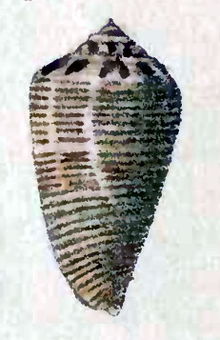Conus scalptus is a species of sea snail, a marine gastropod mollusk in the family Conidae, the cone snails and their allies.[2][3]
| Conus scalptus | |
|---|---|

| |
| Drawing of a shell of Conus scalptus | |
| Scientific classification | |
| Domain: | Eukaryota |
| Kingdom: | Animalia |
| Phylum: | Mollusca |
| Class: | Gastropoda |
| Subclass: | Caenogastropoda |
| Order: | Neogastropoda |
| Superfamily: | Conoidea |
| Family: | Conidae |
| Genus: | Conus |
| Species: | C. scalptus
|
| Binomial name | |
| Conus scalptus Reeve, 1843
| |
| Synonyms[2] | |
| |
Like all species within the genus Conus, these snails are predatory and venomous. They are capable of "stinging" humans, therefore live ones should be handled carefully or not at all.
Description
editConus scalptus is a small (16–45 mm) and has a medium weight. The shell is turbinated with convex sides, rather solid, polished, grooved towards the base. Its color is whitish, with numerous hair-like, light brown, revolving lines. The protoconch is dirty white. The spire is spirally striated, rather elevated, with a sharp apex. Its color is variegated with chestnut. There are 6-7 post nuclear whorls with 2-4 incised spiral grooves on the inner side of each whorl.[4]
Distribution
editMost true Conus scalptus appear to be from the Philippines, designated as type locality by Filmer (2011).;[3] off Papua New Guinea.
References
edit- ^ Duda, T. (2013). "Conus scalptus". IUCN Red List of Threatened Species. 2013: e.T192834A2170390. doi:10.2305/IUCN.UK.2013-1.RLTS.T192834A2170390.en. Retrieved 20 July 2024.
- ^ a b Conus scalptus Reeve, 1843. Retrieved through: World Register of Marine Species on 27 March 2010.
- ^ a b R. M. Filmer (2011). "Taxonomic revision of the Conus spectrum, Conus stramineus and Conus collisus complexes (Gastropoda - Conidae). Part II: The Conus stramineus complex". Visaya. 3 (4): 4–66.
- ^ G.W. Tryon (1884) Manual of Conchology, structural and systematic, with illustrations of the species, vol. VI; Philadelphia, Academy of Natural Sciences
